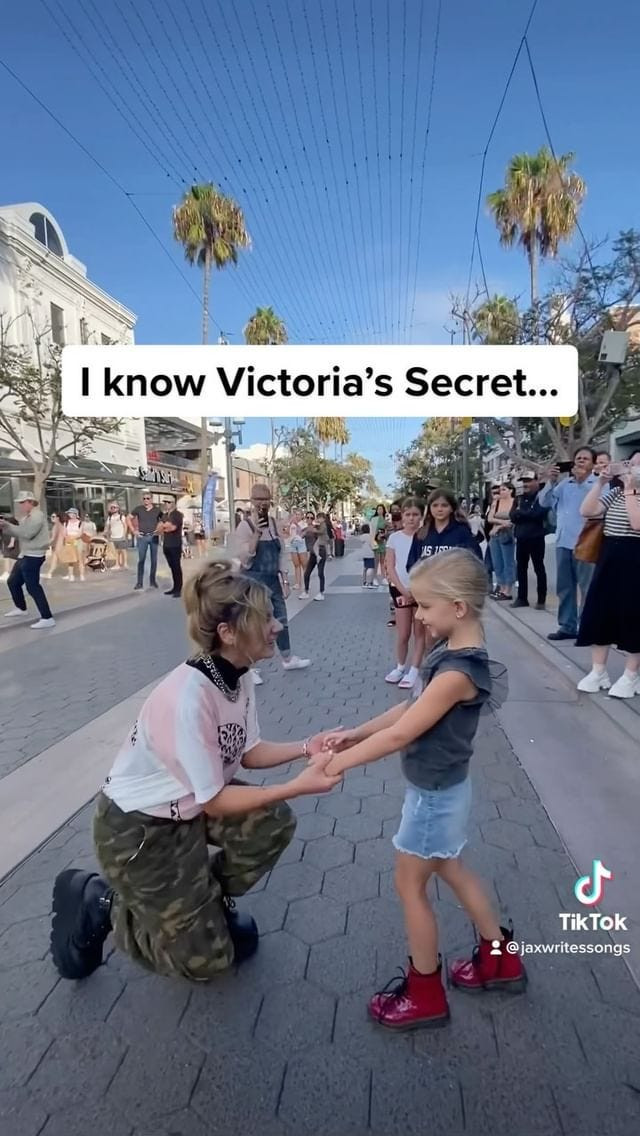Jax’s song “Victoria’s Secret” has become more than just a viral TikTok hit; it’s a cultural moment sparking conversations about body image, beauty standards, and the legacy of brands like Victoria’s Secret. This anthem, resonating deeply with millennial moms and younger generations alike, dissects the unrealistic expectations perpetuated by the lingerie giant and celebrates body positivity in a powerful way.
The song’s journey to virality is a testament to its relatable message. Jax, a former American Idol contestant turned TikTok sensation, penned “Victoria’s Secret” after witnessing the distress of a 12-year-old girl she babysits, Chelsea. Chelsea’s mall experience, where a friend’s cruel remarks about her body triggered insecurities while trying on bikinis, became the catalyst for the song. Jax channeled this experience into lyrics that expose the “secret” behind Victoria’s Secret: the brand’s reinforcement of unattainable beauty ideals and its impact on young women’s self-esteem. The initial TikTok video showcasing the song quickly amassed millions of views, followed by a powerful flash mob performance outside a Victoria’s Secret store, further amplifying its message. The song’s climb up the Billboard Hot 100 and iTunes charts solidified its status as the anthem of the summer, striking a chord with listeners far beyond TikTok.
The lyrics of “Victoria’s Secret song” are raw and unflinching. Jax directly confronts the damaging effects of Victoria’s Secret’s beauty culture, referencing her own struggles with an eating disorder fueled by the pressure to conform. Lines like “I stopped eating, what a bummer / Can’t have carbs and a hot girl summer” reveal the drastic measures young women feel compelled to take to achieve the “ideal” body. The song further pulls back the curtain by naming Les Wexner, the former CEO of Victoria’s Secret’s parent company, as the “old man who lives in Ohio, making money off of girls like me.” This lyric directly challenges the brand’s manufactured image of female empowerment, exposing the male figure profiting from these insecurities. The mention of Wexner’s ties to Jeffrey Epstein adds another layer of discomfort and underscores the exploitation inherent in the beauty industry’s power structures.
“Victoria’s Secret” resonates deeply with millennial moms, a generation that grew up in the heyday of Victoria’s Secret’s dominance. For millennials, Victoria’s Secret was more than just a lingerie store; it was a cultural touchstone, shaping perceptions of beauty and desirability. Many millennial women recall feeling pressured to emulate the impossibly thin “Angels” and striving for the “Victoria’s Secret body.” Jax, though technically a younger millennial or elder Gen Z, taps into this shared experience. The song evokes a sense of nostalgia for the 90s and early 2000s, a time defined by brands like Victoria’s Secret, Abercrombie & Fitch, and the pervasive pursuit of unattainable thinness. The viral TikTok tributes and lip-sync videos created by millennial moms highlight the song’s intergenerational appeal. These women, now raising their own daughters, are using “Victoria’s Secret” as a tool to teach body positivity and challenge the harmful messages they themselves internalized.
Victoria’s Secret’s response to the viral song and the ensuing backlash has been closely watched. Initially, the brand issued a damage control statement acknowledging past missteps and claiming a commitment to change. However, Jax and many others remain skeptical. Jax’s pointed reply, questioning Wexner’s continued influence and highlighting the brand’s history of body dysmorphia, underscores the deep-seated mistrust and the demand for genuine transformation, not just superficial PR. Subsequently, Victoria’s Secret’s CEO, Amy Hauk, released a handwritten note praising the song and soliciting customer feedback. While this gesture was seen by some as a positive step, the overwhelming response on social media platforms like Instagram and TikTok reveals the vast gap between Victoria’s Secret’s current offerings and consumer desires. Comments flooded in, demanding extended sizing, diverse representation of body types and ages in advertising, and a move away from excessive photoshopping.
Despite the song’s powerful message, some critiques have emerged. The original video, while impactful, includes a moment where Jax reacts with outrage to the “fat and flat” insult without explicitly clarifying that “fat” is not inherently negative. This nuance is crucial, as using “fat” as an insult, even in outrage, can inadvertently reinforce negative connotations. Similarly, the lyric about being “overweight” according to magazine covers raises questions about the language used to discuss body size. Furthermore, the song’s viral success, while significant, is fronted by a thin, white, able-bodied woman, raising questions about representation and centering in body positivity conversations. While acknowledging these valid points, it’s also important to recognize the song’s overall impact and the progress it represents. As the original article notes, “songs about body autonomy shouldn’t be the work only of fat creators of color.” Jax, as a thin, white woman, using her platform to critique beauty standards and amplify body positivity is a significant step in dismantling harmful norms.
Ultimately, “Victoria’s Secret song” is more than just a catchy tune; it’s a cultural artifact reflecting a shift in attitudes towards body image and beauty standards. While Victoria’s Secret’s website and marketing still largely perpetuate unrealistic ideals, the song’s viral success and the public conversation it has ignited offer a glimmer of hope. It suggests that younger generations are increasingly aware of and resistant to these harmful messages. The enthusiasm with which children and teenagers have embraced the song, seemingly understanding its message innately, is particularly encouraging. “Victoria’s Secret” serves as a powerful reminder that the revolution in body positivity is not happening within corporate boardrooms or marketing campaigns, but in the collective consciousness of individuals who are ready to reject unrealistic beauty standards and embrace body autonomy. This song is an anthem for change, empowering individuals to find their value beyond societal pressures and celebrate themselves, just as they are.
[



